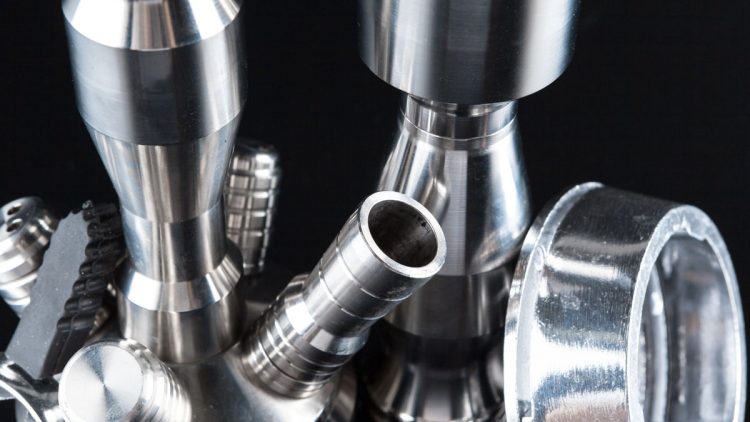Machining Titanium
Presently in the manufacturing sector, titanium and its alloys are staples in medical, aerospace, automotive, and weaponry applications. This favorable metal is rust and chemicals resistant, can be recycled, and is exceedingly strong for its weight. Nevertheless, there are a number of challenges that are required to be taken into consideration when machining titanium and choosing the proper tools and variables for the project.
Titanium Varieties
Titanium is available in a multitude of varieties, including just about 40 ASTM grades, as well as many additional alloys. Grades one through four are deemed commercially unsullied titanium with differing requirements on supreme tensile strength. Grade five (Ti6Al4V or Ti 6-4) is the most typical combination, alloyed with 6% aluminum and 4% vanadium. Even though titanium and its alloys are usually classed together, there are some key differences between them that should be noted prior to establishing the ideal machining method.Titanium Concerns
The following are some of the titanium concerns that need to be addressed.Work holding
Even though titanium may have more preferable material attributes than the average steel, it also acts more flexible and is usually not as unyielding as other metals. This requires a firm grip on titanium workpieces, and as unyielding a machine configuration as is possible. Other factors include avoiding broken cuts and keeping the tool moving the entire time of contact with the workpiece. Staying in a drilled hole or ceasing a tool next to a shaped wall is going to cause the tool to grind – producing excessive heat, work-hardening the workpiece, and causing untimely tool wear.Heat Generation
Heat is a worthy opponent, and heat creation must be factored in when choosing speeds and feeds. Whereas commercially unsullied grades of titanium are gummier and softer than most of its alloys, the adding of alloying elements usually increases the hardness of titanium. This raises concerns regarding created heat and tool wear. Retaining a larger chip load and avoiding needless grinding aids with tool performance in the harder titanium alloys and is going to decrease the amount of work hardening created. Selecting a lower RPM, in addition to a larger chip load, can provide a considerable decrease in temperature when compared to higher speed alternatives. Because of its low conduction attributes, keeping temperatures to a minimum is going to put less stress on the tool and decrease wear. Utilizing high-pressure coolants is also an effective technique to decrease heat creation when machining titanium.Galling and Built-Up Edge
The next obstacle to think about is that titanium has a high tendency to stick to a cutting tool, producing built up edge. This is a crafty matter which can be decreased by using ample quantities of high-pressured coolants directly aimed at the cutting surface. The objective is to remove chips sooner than later to stop chip re-cutting and keeping the flutes clean and free of debris. Galling is a huge matter in the commercially unsullied grades of titanium because of their “gum-like” nature. This can be dealt with utilizing the tactics aforementioned like continuing feed at all times of workpiece contact and utilizing plenty of high-pressure coolant.Titanium Solutions
Whereas the main issues when machining titanium and its alloys may change, the techniques for alleviating them stay slightly constant. The main notions are to avoid galling, heat creation, workpiece hardening, and workpiece or tool diversion. Utilize a lot of coolant at high pressure, hold speeds decreased and feeds up, have the tool moving when in contact with the workpiece, and use as unyielding of a setup as you can. Additionally, choosing a proper tool coating could help make your project a prosperous one. With the high heat being created throughout titanium machining activities, having a coating that can properly address the temperature is essential to maintaining execution throughout an operation. The proper coating is also going to help to avoid galling and discharge chips effectively.East Valley Precision – Custom Machinery Specialists
East Valley Precision offers custom CNC Machining in the Chandler, Arizona and surrounding areas. When you need precision CNC machining and milling contact East Valley Precision. Call us at 480-288-6601 for more information or use our form for a quote. 0

